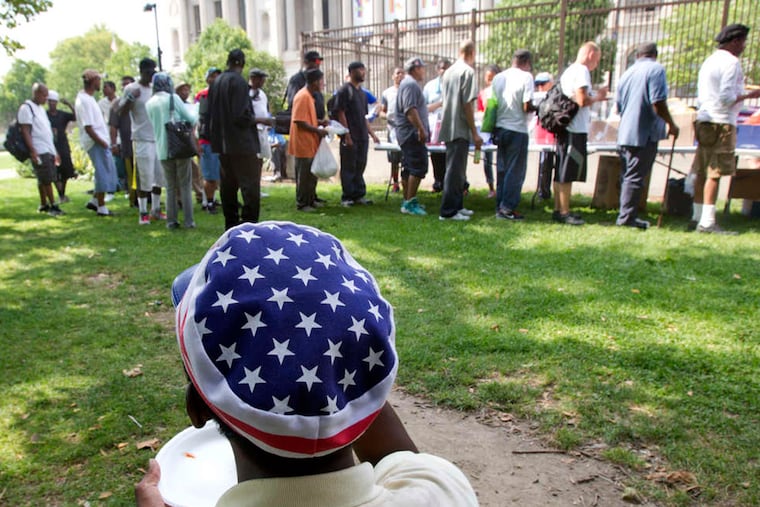Kenney overturns homeless feeding ban on Parkway
Nutters four-year feeding ban left a bitter taste in the mouths of the poor.

WELL, ISN'T this surprising.
Four years ago, with lots of fanfare, Mayor Michael Nutter issued a ban on group feeding in city parks. Yesterday, with little to-do, Mayor Kenney lifted it.
Kenney's reason confirms the suspicions of those who believe the ban was more about appeasing rich tourists than it was about protecting the poor.
"The mayor doesn't want Philadelphia to be a city with this ban on the books," said Kenney spokeswoman Lauren Hitt. "He doesn't like the signal it sends and how it stigmatizes the poor."
As Nutter himself might say, "It's a new day!"
When Nutter issued the ban in 2012, advocates for civil rights and the homeless went ballistic. They said it denied religious groups their right of free expression to feed the poor - as Christianity, especially, commands.
(Google Jesus and feed and you'll understand.)
Others were appalled by the ban's timing. It took effect two weeks after the Barnes Foundation opened its $200 million digs on the Ben Franklin Parkway, where do-gooders dispensed meals to the poor who congregated on that gateway to Center City.
The Parkway's Rodin Museum had also just undergone a $19 million redo, and Sister Cities Park was about to open across from Swann Fountain.
The dingy strip was finally becoming a world-class tourist draw, but city boosters feared its potential would be limited by the spectacle of hungry people lining up every night for free eats.
The city couldn't just chase the poor off the Parkway, which is public property. But a feeding ban might have the same effect - if its reason were high-minded enough to mitigate the criticism.
In this case, the good intentions came from then-Health Commissioner Donald Schwarz. He said the ban addressed the safety of the do-gooders' food, whose preparation was unbound by handling regulations that protect the public from foodborne illnesses.
If groups wanted to feed people, they'd need permits from the city to do so. The kitchens where they prepped food would have to be inspected. And they'd have to tell the Board of Health where and when they'd dispense food and what they planned to serve.
Good thing Jesus didn't live in Philly when he stretched those loaves and fishes into enough food to feed 5,000. Can you imagine the paperwork?
In defense of Nutter, who was everybody's mayor, not just the do-gooders', the Parkway in front of the Free Library and what was then Family Court often resembled a refugee camp, trash-strewn and reeking of human waste.
Not just tourists were taken aback by the conditions. So were those who lived, worked, or worshipped in the area. So would be any new business owner or resident whose dollars the city needed if it were to keep climbing out of the financial wreck Nutter faced in his first term in office.
As for Schwarz, he was a very good public servant whose policies had resulted in, among other improvements, reduction in HIV, infant mortality and teen-pregnancy rates, especially among the poor. No one should accuse him of anything untoward in helping craft the ban.
Hunger, homelessness, and poverty create a three-pronged beast that eats at the heart of every city trying to balance compassion for the poor with policies that preserve and promote its own vitality. How else can they pay for programs that help the vulnerable?
But you didn't have to be a bleeding-heart softie to feel offended by Philly's feeding ban, which would impose fines on those who didn't comply with it. As an Inquirer editorial noted, "That would be an odd twist - shifting gears into making food handouts an act of civil disobedience, rather than acts of charity."
Religious groups filed a federal complaint, arguing that the ban violated the exercise of their beliefs. A judge sided with them, issuing an injunction that the city agreed not to appeal. Instead, both sides agreed to revisit the situation every 90 days.
The injunction was never lifted and the groups kept feeding the poor - but always under the threat that, at the next 90-day review, the ban might go into effect.
Yesterday, Kenney removed it for good, and the Rev. Violet Little couldn't be more grateful.
"Here's the thing," says Little, Lutheran pastor of Welcome Church, a "church without walls" that holds outdoor services twice a month for the homeless. "The mayor and the city were never the enemy. The enemy has always been homelessness, poverty, and hunger. This lets us work together against a common enemy."
She acknowledges there are many indoor sites where the poor can access food and services. But mental illness, fear, and physical limitations still keep some away.
"We meet people where they're at," she says. "By forming relationships with them and building trust, we've been able to move people off the street and into homes. But it takes time."
And it requires teamwork, says Brian Jenkins, executive director of Chosen 300 Ministries Inc., the homeless-advocacy group.
"For the mayor to lift the ban and express the kind of compassion a mayor should have, that's how you build a partnership that can solve homelessness," he says.
I think Nutter was a compassionate man who tried something different. When he got blowback, he backed off - 90 days at a time, but he still backed off.
Today, though, is a new day.
215-854-2217N>@RonniePhilly
Blog: ph.ly/RonnieBlog
Columns: ph.ly/Ronnie